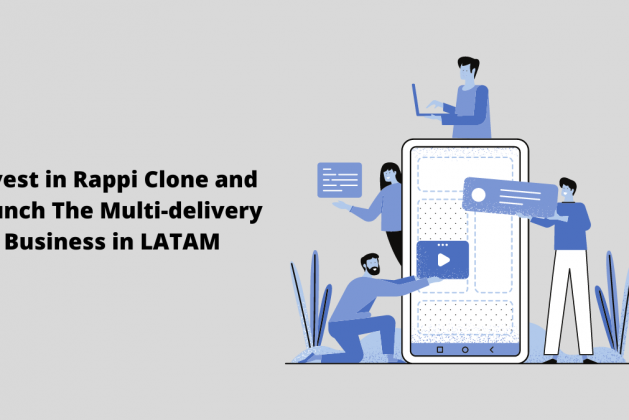Technological advancements are also increasing exponentially with time. These days, almost anything can be done with a smartphone app. However, success in the startup business always attracts imitators and competitors. Latin America’s meal delivery sector is one of the most competitive globally due to prior triumphs.
Latin America is no stranger to the concept of doorstep delivery. For years, mom-and-pop shops, pharmacies, restaurants, and huge grocery chains have provided the service. However, it was relatively uncommon for these enterprises to employ full-time delivery people to ensure that products were delivered quickly and reliably to clients.
Learn more: Succeeding in the On-Demand Food Delivery Business With the Right Set of Essential Features
On-demand applications have the highest rate of user increment among those applications. Rappi is a new on-demand delivery service launched a few months ago. The application now has a market value of roughly $300 million. Rappi, a Colombian delivery firm that recently raised $200 million at a $1 billion valuation, is the newest member of the Latin American delivery startup club receiving international notice.
Many large on-demand delivery systems, such as Uber and Amazon, are already on the market. However, due to apps like Rappi, more and more entrepreneurs are becoming encouraged to create new and innovative on-demand delivery solutions. In addition, the coronavirus outbreak in 2020 has already altered our daily lives. Doctors advise people to maintain social distance to prevent the virus from spreading while keeping themselves safe.
As a result, these sorts of delivery applications play a critical role in saving the lives of the majority of people in our country. With the help of Rappi like platforms, customers may meet their everyday grocery, food, and pharmaceutical demands. Surely, most entrepreneurs now want to leverage Rappi like solutions for their conventional businesses, so before discussing Rappi clone, let’s uncover some interesting facts about Rappi itself, a Latin-American Giant.
See more: Benefits and Features of On-Demand Apps for the Business
Rappi – A Colombian Super Application
Rappi is the most well-funded on-demand delivery firm in Latin America. It has the most extensive presence in the area, with operations in Colombia, Argentina, Brazil, Chile, México, Peru, Ecuador, Costa Rica, and Uruguay.
- The company has gone beyond simply competing in the meal delivery market. “Rappi Favors,” where you can pay a fee for a special request; “Rappi Pay,” a virtual wallet that allows users to pay for external services in the app;
- “Rappi Mall,” which gives users instant access to thousands of stores, and “Rappi Bets,” which allows users to gamble on sports and casino-style games online directly from the app, are just a few of their value propositions.
- Rappi is also a shareholder of Delivery Hero, with a $105 million investment in 2018. Rappi secured a $1 billion investment from Japan’s Softbank in April 2019, the single largest investment into a Latin American business, resulting in a unicorn valuation of $3.5 billion.
Source: Rest of World
Rappi’s success in the on-demand industry is not based on any hidden secrets. Rappi is renowned as the “Super-app” because of its ability to provide everything at the user’s doorstep. Rappi’s business model is to give everything that Amazon/e-commerce does, but with the added benefit of quick delivery.
Undoubtedly, the online delivery business across the world is booming. Still, Latin America has become a sweet spot for entrepreneurs, and this is the reason why they are willing to have their own rappi clone platform because there are very few players. Furthermore, Peru and Colombia’s online ordering and purchase ratios are about to touch 70%, so there is a high chance of success in this growing sector.
What is a Rappi Clone?
Rappi clone allows entrepreneurs to offer many services under a single application. From food delivery to courier delivery to grocery ordering to making instant payments, Rappi clone has a customer-inclined approach that automates business operations and thus generates profits from multiple sources.
Rappi clone combines 70+ services your company requires, making it a full-service on-demand provider. The Clone Script solution enables you to run an on-demand business that efficiently meets your customers’ needs.
It provides faultless navigation, easy and rapid verification, and a better user experience while providing exceptional services. In addition, the software has a dynamic dashboard that allows you to have complete control over your company’s operations.
Multi-service Business In LATAM is the Kingdom of the On-demand Sector
Latin America’s on-demand economy has dominated the region’s startup news for more than a year. Brazil’s iFood raised $500 million in the largest startup round in Latin American history towards the end of 2018, topping the total VC investment for 2016 in a single round. Rappi, a Colombian company, broke the mark four months later, raising $1 billion from Softbank to assault the region.
In Latin America, there are over 415 million mobile phone users, with about two-thirds accessing the Internet almost exclusively through their phones. The region’s first on-demand firms have opened the market to reach these consumers by providing easy and economical services directly through smartphone apps.
You’re well aware of the extent to which users choose on-demand services. If you only intend to use one on-demand service, you should reconsider your decision. Multi-service enterprises are causing a stir in the business world, and there is no better time to start one than now.
Taxi booking, meal delivery, handyman services, and grocery delivery are all common on-demand services offered by multi-service apps. Other services include childcare, pet care, laundry, medication delivery, and alcohol delivery. Users’ preferences for these services are solely determined by their demographics. As a result, demographic analysis is a critical factor for any company.
How does Rappi Clone Help Entrepreneurs Rule the LATAM Market?
The meal delivery sector in Latin America is not a new concept; it has grown into a $6.5 billion market in the last decade. The industry is not going away anytime soon, thanks to factors such as a culture of immediacy and instant access, a more affordable and accessible workforce (the minimum wage in Latin America is approximately US$318/month), the exponential growth of the smartphone market (in 2019, smartphones accounted for 66 percent of all mobile connections in Latin America), and, most recently, the pandemic.
Know more: Urbanclap Clone: A New Way to Uplift Local Service Business
Now, let’s go through some reasons why Rappi clones help entrepreneurs dominate the Latin American delivery business.
Built with Modern Technologies
Once your company has established itself, you will consider expanding and providing services to further locations, potentially adding thousands of new customers to your customer base. Your Rappi Clone app must have that technical capability to meet the increasing demands. Fortunately, the food and grocery delivery apps are built on cutting-edge technology, making them scalable businesses to handle future business growth.
Customizable Readymade Product
The Rappi Clone App is a ready-to-use but customized solution, meaning it has previously been tested and validated to work with your business model. Entrepreneurs have the ability
Saves Time
As a ready-to-launch script, the Rappi Clone App comes with a pre-installed feature that automates your food and grocery delivery operations. It’s a fully functional app that allows you to have your business up and running in a week.
Integration of Multiple Services
Rappi like solution comes with multiple services, be it food, medicines, making payments, ordering groceries, or sending couriers; the platform makes it much easier for entrepreneurs to manage everything in one place. Moreover, they can add or remove any merchants at any time.
Exclusive Offers
In order to increase the number of users and the number of orders placed. These Rappi clone applications frequently give their consumers amazing deals and discounts on merchandise. Many Rappi clone applications also implemented unique reward schemes for their dedicated users. Users can earn reward points for every purchase made through the apps using this method. These points can then be redeemed for discounts on future orders using these apps.
Well, a digital platform offers numerous benefits to entrepreneurs. Asia, Europe, the USA, and Latin America are constantly coming up with new ideas and entering the on-demand market but the surprising fact is that all are doing well and making headlines in their respective regions.
In short,
Latin American customers have proven to be early adopters of on-demand economy solutions, resulting in the development of new business models to cater to a more intelligent public. For example, in countries like Brazil and Mexico, Latin America’s ghost kitchens and supermarkets are making significant rounds. Mimic, a cloud kitchen firm based in Brazil, recently raised $9 million in a seed round to expand locally, while Justo, Latin America’s first “cloud supermarket,” recently raised $10 million to consolidate in the Mexican market.
From the above facts, it seems terms like Ghost kitchen, contactless deliveries, contactless payments, doorstep deliveries, ride booking, etc., have become the norm, and entrepreneurs are keen to leverage this norm by having a robust and scalable Rappi clone.
Read more: App Like Careem: Why Entrepreneurs are Flocking
Concluding Thoughts
Rappi, a renowned Colombian on-demand delivery app platform, delivers practically everything. Customers can get everything delivered to their door, including prescriptions, groceries, technology, and their favorite foods. Online deliveries and services have gained massive tracking amid the pandemic, and embracing digital platforms in business has become a necessity rather than a luxury.
So what are you waiting for? Want to become a market leader in the LATAM? Have Rappi clone and foray into the on-demand landscape.






Leave a comment